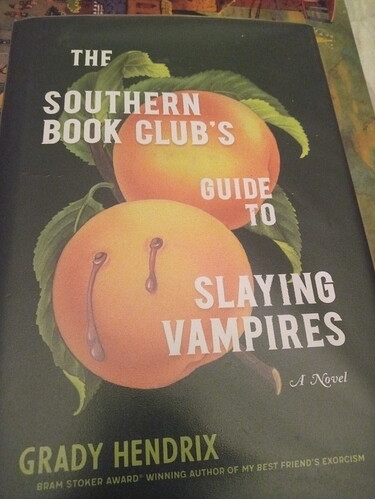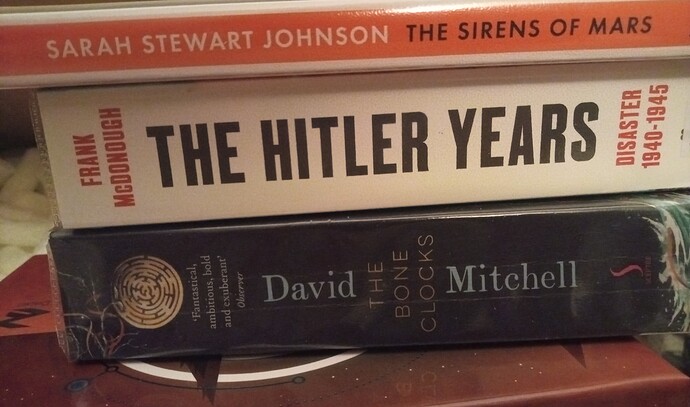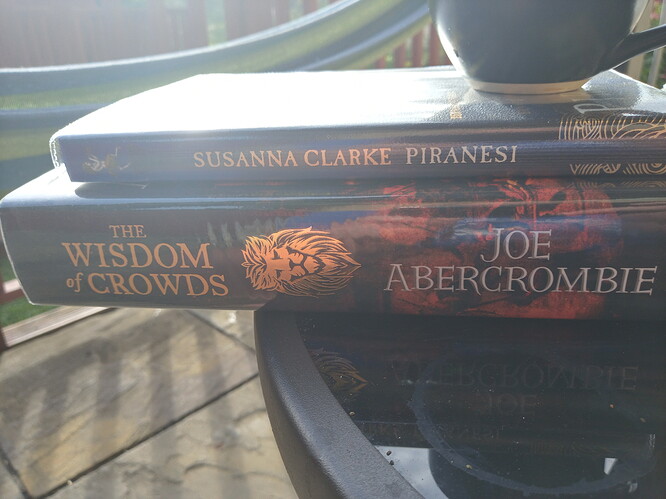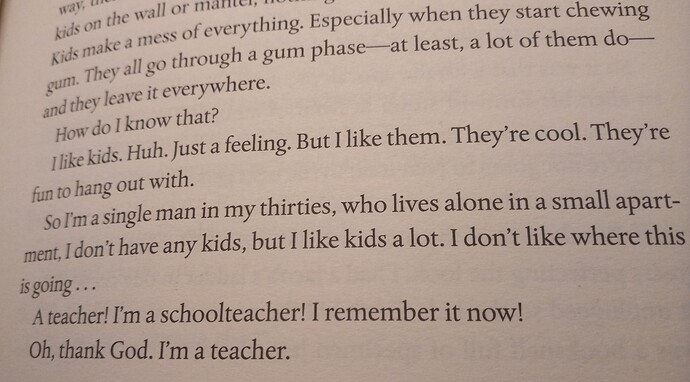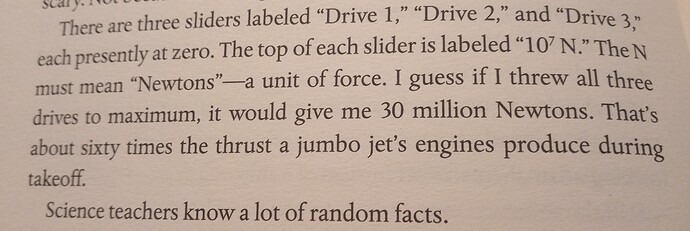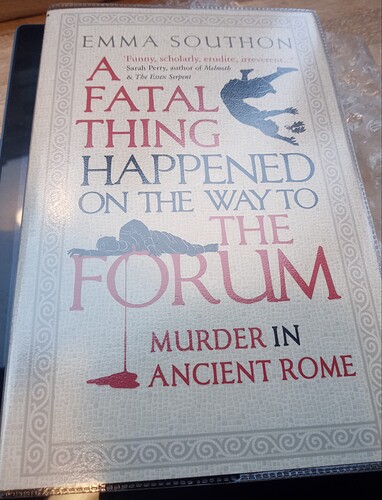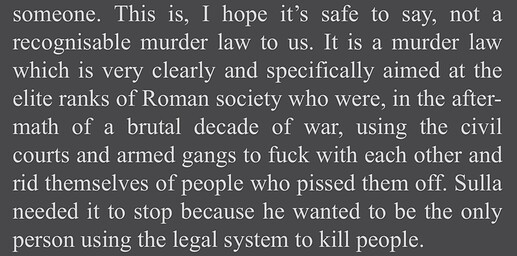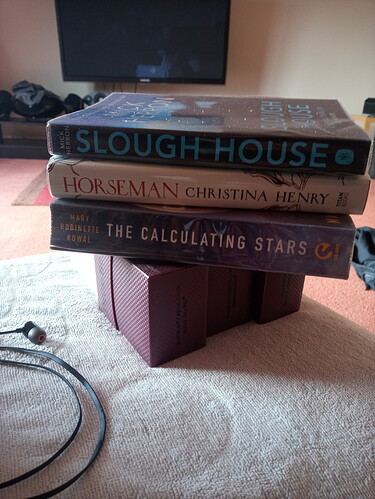A very good modern vampire novel, and one with a lot of relevance to the modern day. The 90s setting is close enough to be familiar but distant enough to present you with differences you also remember, that offer the kinds of complications you can feel in your gut. A bunch of housewives taking on a vampire in small town USA doesn’t sound that compelling, but it’s excellent. Some great characters, jarring violence, and real horror foundations sunk to support a tale of normal domesticity.
Has anyone here read the Red Rising series by Pierce Brown? I’m 80% of the way through book 5. Maybe I don’t have a good memory of the first trilogy, but from what I remember, if I had to assign an MPAA rating to it, it was kind of PG-13 book in the same vein as Hunger Games; it was violent, sure, but not gratuitously. Same for the language.
Now I’m reading this book and is almost feels like a different author to me. The violence and mutilation is so over-the-top that I’m not even sure I can be surprised at this point.
I’m not writing this to come off a prudish or to condemn the book necessarily, but I’m trying to figure out if I am mid-remembering the original trilogy or if the author truly has found a new voice.
They’re sort-of violent; there are plenty of very violent situations in them but the violence isn’t much described. Very much a YA series. Even the first book made me wonder why it was supposedly for teens with kids indulging in hand to hand combat, it seemed like a lot of the writing was neutered to suit the genre.
Yes, that’s how I remembered the trilogy. Well, in this book nobody just dies. They are torn to pieces, melted, impaled, and all other means of bodily horror that would make John Carpenter proud. And nothing seems off limits. Grisly infanticide? Check. Ritualistic cannibalism? Check.
Again, this isn’t necessarily a complaint except the excessive violence is so prevalent that it almost becomes eye rolling near the end. It just isn’t how I remembered the original story.
Perhaps the tone of the original trilogy was a corporate decision to tap into the YA genre and once popular the author was allowed free rein?
No idea squire, but if he’s several books in, he can no doubt do what he likes, the series is popular enough to give him leverage with the publisher.
This week has been a slow week, only a few books, with Sirens of Mars explaining why Mars and the search for life there is so important. You don’t play Terraforming Mars as much as I have without already being enthralled by the idea. Like forcing me to eat cake.
Bone Clocks is a rare re-read. I’m mostly on board with Mitchell, some of his stuff is iffy for me, in the “I would enjoy it if I started to read it” camp, but this and Thousand Autumns of Jacob de Zoet are 100% in my wheelhouse of my jam. Too long, but this is a minor quibble when you’re in it.
The Hitler Years volume 2 because volume 1 was sound and readable, plus the title makes me laugh inappropriately. Very approachable, and a more general work than the likes of Kershaw’s biography.
This weekend I ploughed through Wisdom of Crowds. Never a tough read, Abercrombie isn’t exactly the world’s finest prose stylist, but he has some great lines, and his writing has grown considerably better. I still find some of the sharp turns the story and characters take to be a little too abrupt, but I can also see the book easily spilling over into a fourth volume if they hadn’t been so neck-snapping. Thoroughly enjoyable, all the way through, even when the end seems predictable and inevitable. Some great characters and a world that is becoming increasingly well-drawn.
Piranesi I was deeply sceptical of, as it has received unanimous praise, but I’m halfway through and must grudgingly admit it is an accomplished work. An unusual protagonist and an unusual world, quite some distance from fantasy standard issue.
Have to admit Piranesi was very good. Perhaps should have been a little shorter and tighter, or a little bit longer and more developed, but at about 250 pages it was a quick read regardless. Not the mind-blower everyone is saying, and a trifle too simple, but worthwhile.
Well before laying out my thoughts for this next book I would just like to make a couple of things clear: yes this is a punishment beating, and no, I am not making anything up. Big spoilers ahead, because I can’t cope with this book at all.
My first warning was a quote from Ernest Cline on the cover. That’s a red flag to anyone, but I needed to punish myself. Too many good books, I thought. So what did I read? Project Hail Mary, by Andy Fucking Weir. Now after reading the Martian, and trying to read Artemis, I thought “I bet this guy can’t write three books in the exact same tone.” and ladies and gentlemen, I was 100% wrong. Fuck my eyes. The twee, relentlessly upbeat family-friendly prose is toxic positivity at its finest.
You see, the sun is getting dimmer. In the book, that is. I certainly wished the actual sun was dying as I was reading this. This is due to an interstellar form of life, which is affecting multiple stars, except one, and so a bold mission is launched to investigate said star before the dread beast Climate Change kills us all.
First off, the protagonist in this book is a fucking idiot. Waking from a coma in a small sealed room, he immediately starts fiddling with a stopwatch and improvising an accelerometer like the world’s shittest MacGyver, when it is blatantly obvious to the reader he is on a spaceship. This is just embarrassing. Watching him fiddle around when you already know the answer is cringeworthy stuff, and it doesn’t make him seem educated, intelligent, or resourceful. I’ll ignore the fact his two crewmates both conveniently died in their induced comas, freeing Andy from the strain of having to write more than one character for most of the book. And what a character. Dear me.
Probably what epitomises Ryland Grace to me, is on page 33, where, thanks to the amnesia drugs (we’ll get to that!), he briefly worries he is a paedophile. Just in case you don’t believe me:
I couldn’t make up things that are funnier than what is in this book. Just to be clear: Ryland Grace is supposed to be a former academic turned schoolteacher turned astronaut. What Ryland Grace actually is, is a poorly-written fucking idiot. It has never been more obvious that the writer has consulted with knowledgeable people and is trying to filter that information into a book, and it has never been a bigger failure. Ryland Grace is an idea of what a smart person must be like, if that idea were calibrated halfway accurately for stupid people.
The problem is, Andy Weir is not a good writer. For a book that should be full of jaw-dropping SCIENCE, there is never a single sentence containing any awe, or wonder, or beauty. This is Grace’s reaction to meeting intelligent alien life.
You can almost see Weir’s hand up Grace’s arse, manipulating his face. And it’s like this throughout the entire book. It approaches Dan Brown levels of prose troweled on, because the writer has nothing else and he has a word count to hit. Weir has no real understanding or imagination, and so what he churns out is just a workmanlike description of a thing he already just described. “A million joules?! Why, that’s a million watts!” - Yes, Andy, it is, but it’s also past your bedtime now, come on.
There is no gorgeous imagery or wonderful prose, just blergh smeared on page after page.
So do paedophiles, Andy.
The structure of the book is extremely laboured. It hops between the present, as Grace fucks about in his spaceship, and the past, as all the governments of Earth collaborate without issue to not only get the mission launched, but to accelerate global warming to counteract the inevitable global cooling. This is, occasionally, effective, as Grace’s memory returns at fortuitous times and he flashes back to learning how to wipe his own arse, or do technical stuff, and then we return to him, in space. Wiping his arse, or doing technical stuff.
Apart from the terrible supporting cardboard cutouts consisting solely of racist stereotypes, the only real other character is the intelligent alien Grace meets, who, despite external differences, has a similar psychology, and speaks in a charmingly stilted fashion, like a recent immigrant, or perhaps someone with moderate brain damage. While this element of the story is the best thing about the book, it’s also clearly written with a screen adaptation in mind, complete with complementary skills and moments of heroism. It’s extraterrestrial odd couple stuff, which you have seen in every book and film since Ridley Scott’s Alien at least, and it is getting to be hackneyed fucking garbage.
I don’t find the veneer of plausible science convincing, the prose is terrible, and the book comes apart after nearly 400 pages of derring-do. Grace performs multiple heroic EVAs, repairs, pilots the ship into and out of danger, meets aliens, and so on, and yet we find he is in fact a coward who never wanted to go on the mission and had to be roofied. Weir, at this point, is leering over the book at you and waggling his eyebrows. “Bet you didn’t see that coming, eh?” No, Andy, I didn’t, principally because it doesn’t make any fucking sense. Much like when I got 80% of the way through the Bible and then it suddenly revealed Jesus was in fact a massive cunt.
There’s really no excuse for writing this bad, or for whole books to be this bad. The ending is really shit. Fuck Andy Weir.
I thought it was fine.
I’ve not been a critic for a while.
I’m grumpy, but everything is just too convenient, and science simply doesn’t offer the kind of perfect solutions that slot into exactly the right holes at the right times. It certainly doesn’t do that when you’re in a ship light years from Earth, alone, with amnesia (but also buff from your coma). The book tries hard to remain plausible while taking whopping leaps of incredulity in the background. All the nations of Earth clubbing together with no problems and contributing everything they have under one person with unlimited power to direct the program. Meeting intelligent aliens and having no problems with communication, psychology, and culture, even under enormous stress. Ryland Grace is a coward who does everything bravely and never breaks down in tears, or even hesitates when the chips are down. Even if you overlook the bad prose, which is every page, the problem is the book lies to you and contradicts itself. The book is driven by a toxic positive attitude. If Weir wrote a book about Nazis carrying out a mass shooting the tone would be the same relentless efficient cheer.
The fundamentals of murder in Rome, and how fundamental murder was to Rome. A perfectly approachable and irreverent work that grants the Romans none of their customary grandeur, and examines occurrences in the senate, within marriage, the family, and goes over the different social spheres and the problems in each caused (and solved) by murder.
I haven’t read any Weir precisely because I continually see critiques like that. Bad prose just kills my interest in so many books. And don’t even get me started on Cline. You’re braver than I because a quote on the cover by the aforementioned would have kept me from even picking up the book. I fully understand that nostalgia can be fun, but do not understand how people claim they like “Ready Player One.” Nostalgia isn’t a story but that’s what the whole book is. Nostalgia glued together with the most egregious Deus ex Machina known to literature.
Since we are talking bad Sci-Fi, I read Paolini’s new attempt, “To Sleep in a Sea of Stars,” and thought it was really bad. The writing is very juvenile, which may have been ok when he was publishing at 18 but not now that he’s 40 or something like that. Again, massive amounts of Deus ex Machina kill a plot that is already dragged down by completely unforgettable characters and terrible dialogue.
I’m a Patreon supporter of Dr. Southon. Just her Twitter feed is fascinating.
The final Expanse book comes out next month, I believe, but in the meantime I need to find something else to read. Since I’m on a Dune kick after having enjoyed the movie, I’m considering Dune Messiah. I’ve read all of the Frank Herbert dune books, but it had been about 20 years and I don’t remember books 2-5 much at all. I remember thinking they were a little…weird? Any recommendations?
The second book is okay, but they get successively worse. I think the first one is the perfect place to leave the series.
Agree 100% with @OhBollox on the Dune book ratings. #2 is tolerable, but I’m not sure it’s worth a reread unless you really need to scratch an itch.
As for a suggestion on what to read, I can highly recommend Scalzi’s recent Emperox trilogy. All three are great, and the third one really pays off. If you like The Expanse, I think you’ll like these.
Elizabeth Bear’s White Space novels, or Dickinson’s Baru Cormorant novels.
The division for Dune fans is usually right at 3 and 4. Although I’ve found that most are at least civilized about it.
Books 1-3, to me, are a complete story. Beginning with 4, you get WAY too much navel-gazing horseshit. I found them both laughable and impenetrable.
Since I am a hardcore Dune fetishist I released my inner masochism and started with the “Prequels” to Dune last month for my second readthrough through the whole expanded series.
Since last time there were 5 new books added to the Saga so I can revel in the brain-pain, even more, this time around…
Also, a good reminder that I should get back to the Expanse books next…maybe that get me back into the mood and continue with the Expanse TV series (season 4 onwards)
I love Dune Messiah, and it makes a perfect companion volume for Dune, though it is also where Herbert’s baroque writing style really takes off. Dune is Paul’s rise to improbable and unimaginable power. Dune Messiah is his fall. Children of Dune is, for me, the beginning of the series’ descent into bizarre weirdness for weirdness’s sake.
A Fatal Thing Happened On The Way To The Forum is magnificent.
I adore the verve, and the fact that searches “fuck” and its variants appear 55 times. The scholarship seems solid and is clear about sources. Also I laughed for about 5 minutes after the passage about Cato which includes the phrase “a bowl full of his own boiling cabbage piss”.
What the book achieves is to punch home the message how profoundly alien a society the Republic and early-mid Empire were. Roman values are barbaric to modern eyes, and yet embedded in our cultural inheritance is the belief that the Romans are somehow noble exemplars. A Fatal Thing exhorts you to stop, read the fucking text, and ask yourself if you really want your society to be fucking modelled on these fuckers. Highly, highly recommended to everyone else.
A lot of people think Rome was somehow a direct ancestor to their society. It’s bizarre but if you look at a state where it was busy slapping out laws regarding commerce, but acts like rape and murder were often completely legal, your state probably does not actually have any commonality with it either in spirit or letter.
Slough House is another of Herron’s accomplished novels. Following the Novichok debacle, the MI5 rejects become subject to Russian attention. His characters are superb, his dialogue top notch, and each book has the last gasp of Cold War spirit enduring in the parsimonious modern world of spying. Excellent series.
Horseman is sadly not about BoJack, but is rather a reimagining of the Sleepy Hollow tale. It’s okay I suppose? A bit too fairy tale for me.
The Calculating Stars is a fairly interesting take on an alternate history space program, after a meteorite destroys Washington DC and threatens irreversible climate change in the 1950s. Building on works like Hidden Figures, Kowal examines the difficulties of scientific endeavour when the social constraints of being a woman, or black, or both, hold you and society back, and the double standards necessary, when the work involved was reliant upon human computers, who were overwhelmingly female. Kowal does a convincing job of stitching a lot of maths and physics together despite not knowing that much herself (as she freely admits in the afterword), and keeps the history and technology well-grounded.
